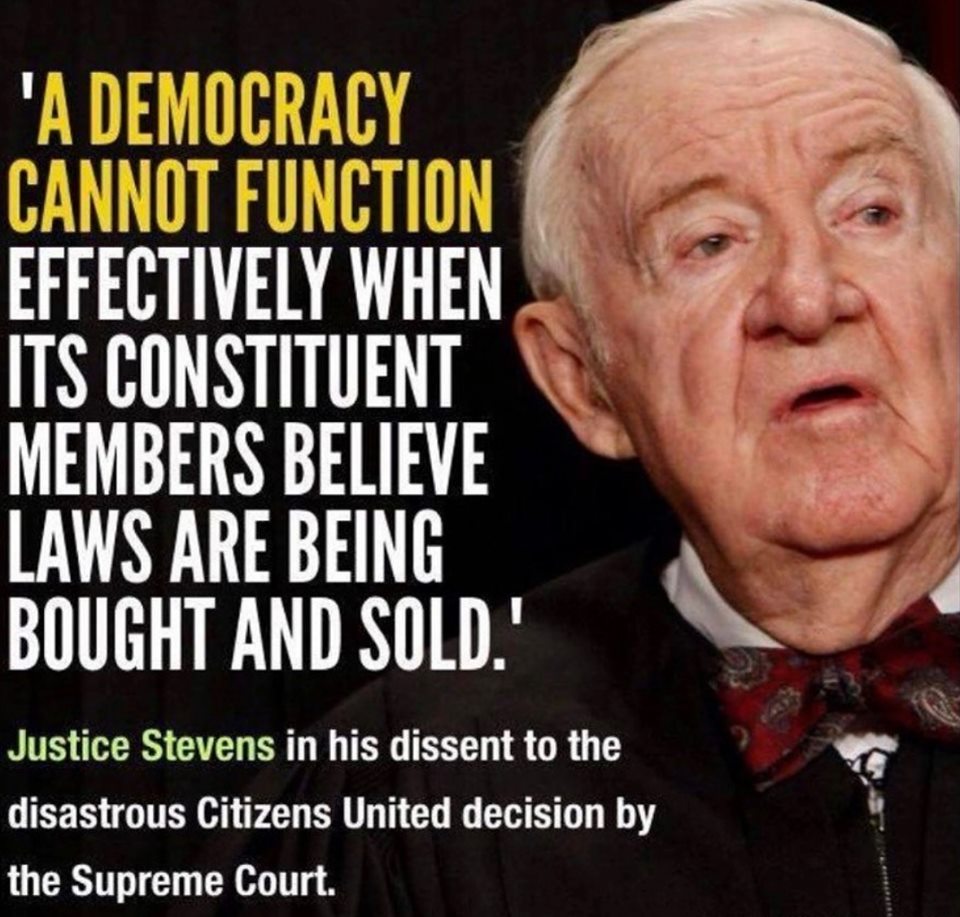John Paul Stevens, Citizens United, and Foreign Money in U.S. Elections

In a 5/4 majority that no one expected, the rights of free speech, protected under the First Amendment and formerly reserved for persons, were now extended to corporations, meaning that corporate entities with billions of dollars in annual profits could spend without limit for the purpose of influencing our elections, effectively rendering voiceless the individual in the voting process.
With the recent passing of John Paul Stevens, who had served 35 years on the bench, this whole catastrophe has been thrown once more into the spotlight, given his vehement dissent that he expressed at the time. Of course, most discussion of the case surrounds domestic corporations, even if they have vast international operations. Suppose (just suppose, hypothetically, wink wink) that Houston, Texas-based ExxonMobil wanted to elect someone to Congress who wouldn’t be at all aggressive in climate change mitigation and thus would slow the rapid phasing out of fossil fuels in favor of renewable energy. Now, Exxon can spend any or all of the $20.8 billion they made last year into making that happen. Yes, you have one vote, and God love you, you take that vote seriously–but they have whatever amount of influence $20.8 billion buys.
The piece linked below, however, looks at the influence of foreign money on our elections, a huge violation of federal laws. The Intercept’s Jon Schwartz, author of John Paul Stevens Was Right: Citizens United Opened the Door to Foreign Money in U.S. Elections, quotes from Stevens’ dissenting opinion:
“If taken seriously, our colleagues’ assumption that the identity of a speaker has no relevance to the Government’s ability to regulate political speech would lead to some remarkable conclusions. … It would appear to afford the same protection to multinational corporations controlled by foreigners as to individual Americans.”
Schwartz then goes on to note: U.S. law strictly forbids any “foreign national” from spending money in U.S. elections. A foreign national is defined as a foreign individual, a foreign corporation, or a foreign government.
Where this is going to end is anyone’s guess. There is enormous support to overturn this decision, via one of several mechanisms set forth in the Constitution, coming from an incredibly wide swath of the left (obviously) and the right (perhaps not so obviously); many well-read conservatives who understand the Constitution are actually more appalled about this than any of we progressives.
In any case, this whole ugly, disgusting scene, one that might forever wreck this experiment in government of, by, and for the people, really is the ultimate Catch 22: We want to get money out of politics, but in order to get law-makers to go ahead with that, we need to first get money out of politics.
If you want to see a really eloquent rant on Citizen’s United, check this out; it’s one of my favorites:

Craig,
The problem with opponents of “Citizens United” decision is they always want “freedom of speech” restricted to those with whom they agree!
Basically, it’s a cry from those who having failed to convince their fellow citizens of the validity of their particular brand of politics, throw a tantrum and yell ” Whaaah…we woz robbed, ..change the rules so only we can win!”
Corporations a legal entities and in many ways have the responsibilities, duties and liabilities of citizens.
Indeed, on of the founding cry in the US Revolution was “No Taxation Without Representation”.
Corporations pay tax, can be charged with both civil and criminal sanctions and represent the economic interests of millions of Americans. US (even multi-national) corporations can drafted in time of war or civil emergency.
These corporations bear a huge responsibility for the livelihoods and economic prosperity of millions, in fact it wouldn’t be too far from the truth to say they are the major stakeholder in the US economy. As such they are entitled to take part in the national debate.
” Take money out of politics” is not just simplistic, but silly. The US was born out of economic issues. The fundamental causes of the Revolutionary war were economic, not idealistic.
Democracy is about inclusiveness. Inclusiveness, means including everyone, even those with whom you don’t agree! It’s a very slippery slope when you begin to decide who does and who doesn’t have a right to participate in the national debate.
When you start to decide which person, group or factions should or shouldn’t be allowed to have their say, it’s never you or your fellow travelers you decide should be excluded! Once you start this process, the list of those allowed to be “included” or participate, gets smaller and smaller until one day, it’s just you.
All the rest are locked out (or locked up if they complain).
Free Speech is for all, even corporations and foreigners. (even residents of Santa Barbara :)).